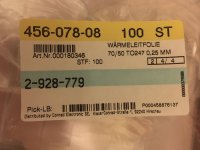Actually it shakes the floor if you believe it 😎(yes with 1v).The same 1v across the speaker now seems to have a bit more control.
I attached a few photos meanwhile I replaced the Aleph J boards inside my amps.
Since I was there I measured also the impedance of the ps caps and got ~5milis for the 47000uf ones and 10milis for the motor run ones.
Don’t know what values these had initially but now after 10y they are better than the specs in the datasheet this if my tool measured ok.
I used for the measurement a battery impedance tester which works at 1khz and measures fine lithium cells.
I didn’t encounter much trouble putting together the amp pcbs. I had a few unsoldered resistor pads that I spotted first of mounting the amp pcbs to the heatsinks.
The real trouble that I encountered was when I mounted the pcbs to the heatsinks because the space there is very tight. The reason about the space forced me to draw my own pcbs.
First of starting the amps I set the bias trimpots for the minimum bias. When I powered them on the bias was ~750ma cold .
Then I slowly set to 1amp, it increased a bit as the amps warmed up.
I didn’t touch the offset trimpots initially, left them in the middle position as they came from the producer.
At first power on the offset was less than 200mv which I trimmed easily to 0mv.
When you turn them on after first setup you get 160mv offset that goes to 0mv in a few secs.
When you turn the amps on/off there is no turn on/off thump.
At power on you can hear the sound “going on” with this I mean that initially the sound is weak and distorted and in a few seconds it goes ok, like with vales until they heat up. You get same behavior at power off.
To drive them I have a ugs muse preamp that fits 2 different topologies of gain stages, one uses the Iron Pre(thanks again to @Zen Mod who helped me with tips to implement the transformers) with no global feedback, the other one uses fets to amplify the voltage and has global feedback.
With the Iron Pre I can get 5db of gain and with the other 10db.
For now I am using the amps with the active gain stage and the combo sounds nice. I still have to try it with the IP which I will do the next days.
In front of the preamp I have a rme dac that is able to put out close to 7vrms.
Forgot to mention but the amps work at 24v.
At this time what I can tell about the sound is that clearly has more bottom control than the aleph j on my 3.4ohm speakers.
Thanks again to Zen Mod and also to Papa for being around!
Since I was there I measured also the impedance of the ps caps and got ~5milis for the 47000uf ones and 10milis for the motor run ones.
Don’t know what values these had initially but now after 10y they are better than the specs in the datasheet this if my tool measured ok.
I used for the measurement a battery impedance tester which works at 1khz and measures fine lithium cells.
I didn’t encounter much trouble putting together the amp pcbs. I had a few unsoldered resistor pads that I spotted first of mounting the amp pcbs to the heatsinks.
The real trouble that I encountered was when I mounted the pcbs to the heatsinks because the space there is very tight. The reason about the space forced me to draw my own pcbs.
First of starting the amps I set the bias trimpots for the minimum bias. When I powered them on the bias was ~750ma cold .
Then I slowly set to 1amp, it increased a bit as the amps warmed up.
I didn’t touch the offset trimpots initially, left them in the middle position as they came from the producer.
At first power on the offset was less than 200mv which I trimmed easily to 0mv.
When you turn them on after first setup you get 160mv offset that goes to 0mv in a few secs.
When you turn the amps on/off there is no turn on/off thump.
At power on you can hear the sound “going on” with this I mean that initially the sound is weak and distorted and in a few seconds it goes ok, like with vales until they heat up. You get same behavior at power off.
To drive them I have a ugs muse preamp that fits 2 different topologies of gain stages, one uses the Iron Pre(thanks again to @Zen Mod who helped me with tips to implement the transformers) with no global feedback, the other one uses fets to amplify the voltage and has global feedback.
With the Iron Pre I can get 5db of gain and with the other 10db.
For now I am using the amps with the active gain stage and the combo sounds nice. I still have to try it with the IP which I will do the next days.
In front of the preamp I have a rme dac that is able to put out close to 7vrms.
Forgot to mention but the amps work at 24v.
At this time what I can tell about the sound is that clearly has more bottom control than the aleph j on my 3.4ohm speakers.
Thanks again to Zen Mod and also to Papa for being around!
Attachments
-
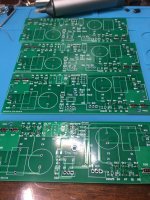 2255E54C-B0EE-475C-895D-7312AE344BD9.jpeg494.9 KB · Views: 169
2255E54C-B0EE-475C-895D-7312AE344BD9.jpeg494.9 KB · Views: 169 -
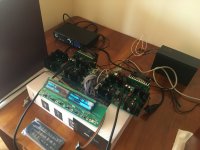 0AE95F6C-90D0-4792-81F8-E8357219AA34.jpeg380.9 KB · Views: 183
0AE95F6C-90D0-4792-81F8-E8357219AA34.jpeg380.9 KB · Views: 183 -
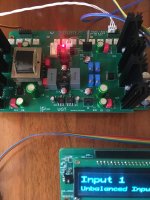 30EF64CC-C962-4311-9E07-8EF1B5419C95.jpeg450.5 KB · Views: 171
30EF64CC-C962-4311-9E07-8EF1B5419C95.jpeg450.5 KB · Views: 171 -
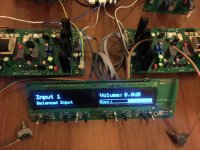 49F90011-FBE0-4885-AB24-E4BB0220F195.jpeg471.8 KB · Views: 175
49F90011-FBE0-4885-AB24-E4BB0220F195.jpeg471.8 KB · Views: 175 -
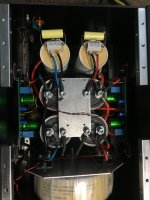 61C7D2CA-4A9E-4B95-A75E-FEA7B7DC9A93.jpeg373.8 KB · Views: 169
61C7D2CA-4A9E-4B95-A75E-FEA7B7DC9A93.jpeg373.8 KB · Views: 169 -
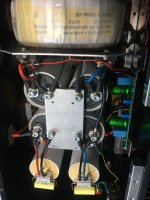 B4F79CEF-67AF-42B7-9398-68464283D670.jpeg374.5 KB · Views: 154
B4F79CEF-67AF-42B7-9398-68464283D670.jpeg374.5 KB · Views: 154 -
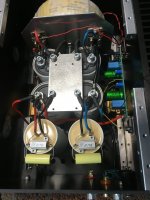 90397E61-7DE2-48A1-A13D-5A7330A76DE7.jpeg385 KB · Views: 480
90397E61-7DE2-48A1-A13D-5A7330A76DE7.jpeg385 KB · Views: 480 -
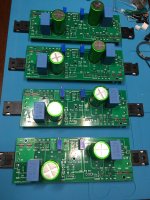 E5F72EB7-E366-472F-984B-C828CA1625A4.jpeg503.3 KB · Views: 151
E5F72EB7-E366-472F-984B-C828CA1625A4.jpeg503.3 KB · Views: 151 -
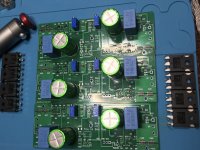 3E81C91D-EDFC-4DD3-8FDF-2292AD1B4E34.jpeg534.1 KB · Views: 157
3E81C91D-EDFC-4DD3-8FDF-2292AD1B4E34.jpeg534.1 KB · Views: 157
Yesterday I finished listening to music very late, I kept saying many times to myself “this is the last track and after I will go to bed”.
Very nice and clear sound similar to the alephs, the only differences that I noted till now is that the boo controls better the lower end and also gives the impression of higher level.
The last month I kept the multimeter connected to the aleph js output and always calibrated at not more than 1v. Yesterday I did the same, I always calibrated for 1v but received complaints quick after first power on to lower the level 😎 because it’s too loud.
Today I replaced the gain stage in front of the amp with the IRON PRE.
With the IP I get same gorgeous sound, seems a bit more clear(specially the voices) and also more accentuated bottom end.
It’s a very hard decision when you have to turn off these.
Very nice and clear sound similar to the alephs, the only differences that I noted till now is that the boo controls better the lower end and also gives the impression of higher level.
The last month I kept the multimeter connected to the aleph js output and always calibrated at not more than 1v. Yesterday I did the same, I always calibrated for 1v but received complaints quick after first power on to lower the level 😎 because it’s too loud.
Today I replaced the gain stage in front of the amp with the IRON PRE.
With the IP I get same gorgeous sound, seems a bit more clear(specially the voices) and also more accentuated bottom end.
It’s a very hard decision when you have to turn off these.
make Arduino based controller thingie - small cam, monitoring are your eyebals shut for more than 3min, if yes, powering down amps
rest can stay On indefinitely
rest can stay On indefinitely
Sometimes I do listen to music with my eyes closed.
After a certain hour something like you describe can be good to have.
I didn’t mention in the earlier post about offset and bias after initial adjustment. From cold to hot the bias drifts 1% in my case and the offset goes to 0mv and stays there. Very stable!
Probably the next week I will do some thd measurements.
What changes if you use pucks in this circuit? Used at same supply voltage and bias current.
After a certain hour something like you describe can be good to have.
I didn’t mention in the earlier post about offset and bias after initial adjustment. From cold to hot the bias drifts 1% in my case and the offset goes to 0mv and stays there. Very stable!
Probably the next week I will do some thd measurements.
What changes if you use pucks in this circuit? Used at same supply voltage and bias current.
no benefits with pucks vs. present, with same voltages and current
with pucks you must go higher with rails, even if follower stage, interelectrode capacitances still issue under some voltage threshold
say with pucks, ZM is chicken bellow 30V per rail
with pucks you must go higher with rails, even if follower stage, interelectrode capacitances still issue under some voltage threshold
say with pucks, ZM is chicken bellow 30V per rail
30v rails will increase the dissipation a lot, not very useful in my case.
Like they are now it’s perfect from the dissipation point of view, I can leave them on also in the summer months which with the alephs wasn’t happening. I measured the temperature only by hand and i think they are at 45c on the heatsink. The alephs had 55c with same 22c room temp. You can keep your finger longer than 5s even on the mosfet body.
It all seemed right that I didn’t feel the need to pull out the temperature probe from its bag.
One thing I didn’t understand very well from the datasheet was how to mount the keratherm pads.
I mounted them with the shiny face(the datasheet says the film side so I supposed it’s this one) pointing to the heatsink.
Like they are now it’s perfect from the dissipation point of view, I can leave them on also in the summer months which with the alephs wasn’t happening. I measured the temperature only by hand and i think they are at 45c on the heatsink. The alephs had 55c with same 22c room temp. You can keep your finger longer than 5s even on the mosfet body.
It all seemed right that I didn’t feel the need to pull out the temperature probe from its bag.
One thing I didn’t understand very well from the datasheet was how to mount the keratherm pads.
I mounted them with the shiny face(the datasheet says the film side so I supposed it’s this one) pointing to the heatsink.
side with Keratherm is irrelevant
what is - it must be 86/82 and you must remove plastic packing sheet
we had case or two where Greedy Boy didn't remove plasticky - it was hot and smelly
what is - it must be 86/82 and you must remove plastic packing sheet
we had case or two where Greedy Boy didn't remove plasticky - it was hot and smelly

I am using 70/50. It has 1.4W/mK compared to the 6.4W/mK of 86/82. I bought a bag of these many years ago but didn’t use them until now. I will place the temperature probe on the mosfet body to be sure they work fine as my finger sensed.
Attachments
ALERT!
think, 1.4W/mK is faaaaaar worse than 6.4W/mK
I still have bag of damn 70/50 somewhere, but tightly sealed and marked with red marker as BADDDDD!!!!!!!!!
that mistake ( ordered and paid for 86/82, while Buerklin guys sent 70/50, without me noticing/even looking at damn sticker on bag) did cost me few channels of Babelfish M25, same as pair of 17W75XL drivers I later bought , as it was my responsibility they're killed
I did save hard data , hope it'll show properly formated:
so, time for disassembly!!!!
ambient temp 22C
keratherm 86/82 vs. 70/50
heatsink temp 39 39
mosfet body 49 67
allen bolt head 47 63
drain pin 58 83
measured in Babelfish M25 , Iq 1A5, standard rails
think, 1.4W/mK is faaaaaar worse than 6.4W/mK
I still have bag of damn 70/50 somewhere, but tightly sealed and marked with red marker as BADDDDD!!!!!!!!!
that mistake ( ordered and paid for 86/82, while Buerklin guys sent 70/50, without me noticing/even looking at damn sticker on bag) did cost me few channels of Babelfish M25, same as pair of 17W75XL drivers I later bought , as it was my responsibility they're killed
I did save hard data , hope it'll show properly formated:
so, time for disassembly!!!!
ambient temp 22C
keratherm 86/82 vs. 70/50
heatsink temp 39 39
mosfet body 49 67
allen bolt head 47 63
drain pin 58 83
measured in Babelfish M25 , Iq 1A5, standard rails
anyhow, I paid that schooling ...... and made it to my own benefit
due to that:
- using strictly Keratherm 86/82; lesser combo is Alumina pad with goop, lesser ( while still good ) mica+ goop
-using Torque 0.9nM always
-strictly stainless steel screws and split washer; in my neck of wood sole certain way that I get M3 hardware in quality (M4 and upwards I can get with trusty numbers marking, but not M3)
-using contact thermometering thingie, IR guns are for square foot area and up, not for precise pointing
- all my finished amps are having speaker protect module in, when leaving my workshop
so, simple number slip up (86/80 vs. 70/50) ......... damage of more than 1KE in hardware and time, lesson learned
hopefully amp in case was (still is) in possession of decent and friendly guy, aware of Murphy existence , so he didn't doubted my honesty for a second;
as Uhtred would say :
“The preachers tell us that pride is a great sin, but the preachers are wrong. Pride makes a man, it drives him, it is the shield wall around his reputation... Men die, they said, but reputation does not die.”


due to that:
- using strictly Keratherm 86/82; lesser combo is Alumina pad with goop, lesser ( while still good ) mica+ goop
-using Torque 0.9nM always
-strictly stainless steel screws and split washer; in my neck of wood sole certain way that I get M3 hardware in quality (M4 and upwards I can get with trusty numbers marking, but not M3)
-using contact thermometering thingie, IR guns are for square foot area and up, not for precise pointing
- all my finished amps are having speaker protect module in, when leaving my workshop
so, simple number slip up (86/80 vs. 70/50) ......... damage of more than 1KE in hardware and time, lesson learned
hopefully amp in case was (still is) in possession of decent and friendly guy, aware of Murphy existence , so he didn't doubted my honesty for a second;
as Uhtred would say :
“The preachers tell us that pride is a great sin, but the preachers are wrong. Pride makes a man, it drives him, it is the shield wall around his reputation... Men die, they said, but reputation does not die.”

Until yesterday I didn’t even notice that I don’t have the “real” stuff.
I have a bag of 100pcs for to247 and another bag of 100pcs for to220.
For the to220 I am transferring 1w to the heatsink, do you think these(the isolator pads) should also be replaced?
Just for curiosity sake I will do the temp measurement. Today I am away from home but tomorrow it will be the first thing that I’ll do.
The js had goop and a thin teflon band as isolator. They worked like that for 10y with 35w dissipated on the mosfet. Iirc the heatsinks were 33c above room temp and the mosfet body 55c over room temp, similar to what you measured for 70/50.
Now this could be luck that they worked 10y like that and tbh I don’t want to put my luck into play again, I trust your words and I will proceed accordingly!
From where do you buy the 86/82?
Thanks again for being around !
I have a bag of 100pcs for to247 and another bag of 100pcs for to220.
For the to220 I am transferring 1w to the heatsink, do you think these(the isolator pads) should also be replaced?
Just for curiosity sake I will do the temp measurement. Today I am away from home but tomorrow it will be the first thing that I’ll do.
The js had goop and a thin teflon band as isolator. They worked like that for 10y with 35w dissipated on the mosfet. Iirc the heatsinks were 33c above room temp and the mosfet body 55c over room temp, similar to what you measured for 70/50.
Now this could be luck that they worked 10y like that and tbh I don’t want to put my luck into play again, I trust your words and I will proceed accordingly!
From where do you buy the 86/82?
Thanks again for being around !
I did bought both - bad and good, from Conrad.de
bad were just result of my bad luck, so just re-ordered from same place
irrelevant price difference is saying that - them sending wrong one was just simple omission, not deliberate
bad were just result of my bad luck, so just re-ordered from same place
irrelevant price difference is saying that - them sending wrong one was just simple omission, not deliberate
Conrad.de doesn’t ship to my country, I tried also on Conrad.it and the story is the same.
There is also conrad(they don’t use the same name but the web page looks identical) in my country but unfortunately they don’t list the 86/82.
What kind of screw driver are you using to measure the torque?
What circuit would you recommend to use as dc protection on the output?
Edit: just had a phone talk with the guys in my country(from conrad) and they suggested to send an email asking for a price request which I sent now.
There is also conrad(they don’t use the same name but the web page looks identical) in my country but unfortunately they don’t list the 86/82.
What kind of screw driver are you using to measure the torque?
What circuit would you recommend to use as dc protection on the output?
Edit: just had a phone talk with the guys in my country(from conrad) and they suggested to send an email asking for a price request which I sent now.
Last edited:
torque screwdrivers- have Wera for 0.9Nm and Garant for 1.2Nm
plenty of those around and with quick gglsrch you'll know which brand names are
on alixprss you'll find plenty of circs for LSP protect, choose wisely
I have made my own, with uPC1237, but not selling it, that would complicate my life even more
why you didn't put "your country" in profile, sometimes that info helps when searching for some parts (ppl can recommend local sources)
plenty of those around and with quick gglsrch you'll know which brand names are
on alixprss you'll find plenty of circs for LSP protect, choose wisely
I have made my own, with uPC1237, but not selling it, that would complicate my life even more
why you didn't put "your country" in profile, sometimes that info helps when searching for some parts (ppl can recommend local sources)
The conrad guys in my country were so nice and fast that they added the product to the romanian page and I have just ordered a 190mm x 190mm pad which will be cut and drilled(punctured I guess) to the required dimension.
It takes 8 working days to have the delivery so in one word it all went smooth.
It takes 8 working days to have the delivery so in one word it all went smooth.
- Home
- Amplifiers
- Pass Labs
- The marriage
